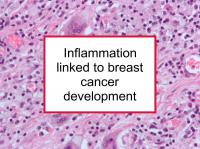Systemic inflammation involves the persistent activation of the immune system. Inflammation increases the risk of breast cancer and reduces survival. However, inflammation can be reduced by diet and lifestyle changes. Now a new study has described the interactions between inflammation signaling and the development of breast cancer.
The study was designed to investigate the role of abnormal inflammatory signaling in the early stages of cancer development. The activation of distorted inflammatory signaling is common in cancer cells. However, how the process begins and its function in the transformation of normal breast cells into cancer cells is not well understood.
In the study, the authors report how the transformation of breast cells is triggered by transient activation of two pathways (MEK/ERK and IKK/NF-kB) and maintained by the activation of an inflammatory signaling circuit (composed of miR-200c, p65, JNK2, HSF1, and IL6).
The authors show that this signaling circuit is present in human cancer cells, as well as in an animal model of breast cancer where the loss of IL6 significantly impaired cancer development.
The authors conclude that targeting this signaling circuit could result in effective breast cancer prevention and treatment.
